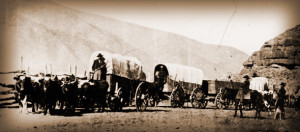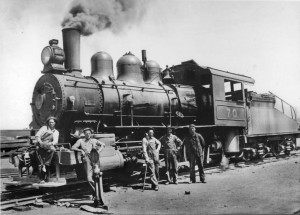By Jonathan Froese
Transportation is something that goes unnoticed in society. People take advantage of transportation, forgetting the significance that it holds within how civilization works. Technology in modern society has been rapidly advancing in America. Our reality consist of cars, trucks, buses, boats, and planes. These elements hold a niche when dealing with mobility; however, transportation has is more than just displacement. Even though transportation in our individual realm of relevance continues to advance and become more efficient in the service of movement, people forget how the evolution of transportation effects economics, sociology, and technology.
During the 1800s, right after Reconstruction, the United States of America was beginning to shift into a new time period. America was starting to expand into the unknown west frontier. The frontier was overtaken by frontiers man, soldiers, traders, and indians. Trails were developed and people would use the trails for a sense of direction. The first forum of transportation during this time was animals and wagons. Horses, mules, or oxen were attached to a long, covered, wooden wagon that could hold up to six tons; it was known as the Conestoga Wagon. It took up to eight horses to pull the Conestoga Wagon. A breed of horse, called the Conestoga horse, was developed from the Conestoga wagon. They were medium-sized draft horses that had the enormous muscle power to pull the heavy wagons. This wagon helped move people from the east to the west. People traveled in lines known as wagon trains, where the wagons mostly carried cargo. Wagon travel was only the beginning to the vast change in transportation technology that would embody the future of America.
As the wagon started to bring people west, there was still the need for transporting products and materials in bulk. The steamboat, invented in 1787, contributed to the distribution of products by being able to travel up rivers. Similar with the Conestoga wagon, steamboats were an essential tool to civilization and expansion of American life within the west frontier. During the early 1800s, steamboats were all over the western rivers. The very first upriver voyage was accomplished in 1815 by the boat Shreve’s Enterprise. This boat made the voyage all the way from New Orleans to Pittsburgh up the Mississippi river. Shorter time taken to travel further distance was booming. Builders, boatsman, and product distributers were dramatically influenced by the power of the steamboat.
Though the west was impacted by the advancements from the wagon and steamboat, an essential aspect was still missing that would bring the United States into a completely new era both economically and socially. Trains not only altered the idea of transportation; they altered the idea of American civilization. The Transcontinental Railroad would bring together the masses within America. The track went all the way from San Francisco Bay and connected to the Eastern U.S. Rail Network. This connection of travel started an upheaval in economic distribution, land development, and government regulation within business. Due to the railroad, businesses like Wells Fargo and American Express were forming. These business started small and earn the required capital to become large firms. During this new period of expansion and development, an economic boom was taking place. Monopolies were forming and would soon become the economic supremacy. Cornellius Vanderbilt had the United States of America his hands… or maybe his wallet. He was a businessman and philanthropist, with great skills in the area of corporate finance. He took advantage of the rail system and invested in many small railroads. America was under his control because railroads were the way of American society. Railroads were a key asset to the augmentation of America’s future. The significance of railroads overpowers any other form of transportation due to the economic and sociological advancements within America.
The wagon, steamboat, and railroad all effected the United States of America and the strive to expand into the unknown west frontier. Each has its own significance within American civilization. People often times forget about significance within history. The history of these three forms of transportation went beyond that of travel; they effected humans within a society and built the future of nation. They also started businesses which later grew into thriving monopolies. These forms of transportation made what is United States of America.


